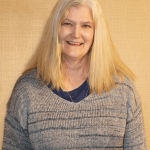ONE YEAR LATER Fostering a Refugee Son in Washington State
[Editor’s Note: This is the second installment on our blog series exploring the health needs of the unaccompanied children and mothers with children who arrived at the US-Mexico border seeking asylum during last year’s ‘border surge.’ Ileana Maria Ponce-Gonzalez, MD, MPCH, CNC, is MCN’s Senior Advisor for Scientific and Strategic Planning, and is based in Seattle, WA. View our first installment here. Subscribe to our blog to receive notifications of upcoming installments.]
Right about the time that I joined Migrant Clinicians Network, at the beginning of 2014, I received an email from a local organization that worked with the University of Washington. It was about readying our community in Seattle to receive some of the unaccompanied children who were showing up in droves at the US-Mexico border. It was about six months before the “border surge,” as it was soon called, was covered widely in the news media -- but many organizations saw it coming before the crisis reached fever pitch.
This first email really got me thinking, and encouraged me to find out more about the issue. I started to read more, and learn more, I heard about it on Univision and elsewhere, about the tens of thousands of children who were arriving or on their way, escaping violence from their own countries, like gun violence, drug cartels, organized crime, and human trafficking. But I also saw that, when they arrived here in the US, they were put into residential centers. When I saw the centers on TV, I didn’t see loving caregivers; I didn’t see an appropriate place for children. It strongly impacted me. For me, the desperation of these children reminds me of my own family. My own family left my home country of Nicaragua, fleeing the violence of the Contra War. I started talking with my husband about the possibility of becoming foster parents for a child now fleeing violence and seeking a better life in this country.
About three months later, I received another email about the unaccompanied children -- this one from the local chapter of Catholic Community Services. My husband and I talked more. We recognized that we can’t help everyone, but we can help one. We thought that being a foster parent may be a good way to give back. We said to each other, we are happy, we love each other, and it would be so wonderful to share this love with someone else. We don’t have any children, but we do have a house with an extra room. So I called Catholic Community Services.
I was pretty disappointed -- they told me I was one block outside of their jurisdiction, so we were ineligible. I was so upset that I actually called the local organization to complain! They told me to call Catholic Community Services again. So I did, and I received the same message. But this time, I asked to speak to management, and when I did so, I received some additional information: my address was indeed outside of Catholic Community Services’ jurisdiction, and was instead inside the jurisdiction of Refugee & Immigrant Children's Program (RICP) at the Lutheran Community Services Northwest.
When I contacted RICP, I was invited to a pre-orientation for potential foster parents in April. I soon learned that, to become a foster parent for one of the unaccompanied children, we would need to attend two separate trainings -- one to become general foster parents through the State of Washington, and another through RICP to learn more specifically about refugees and the additional issues and trauma that the unaccompanied child may have. Washington State’s multi-day training had two modules, each with multiple chapters, which needed to be done consecutively. At least one partner must complete all the trainings -- no tag-teaming. Additionally, RICP had higher requirements for becoming a refugee foster parent. So, overall, it was quite a lot of work.
During the process, I learned that the children who are in RICP are those who have no family ties in the US. Most of the children coming across the border have a parent, or a relative like an aunt or uncle, already in the US. But these children do not. Additionally, they have to prove that they have been politically persecuted, or in human trafficking, or kidnapped by the drug dealers, or suffering from social injustice.
The training that RICP offered covered the wide-ranging behavioral and mental health needs of these unaccompanied children, almost all of whom have experienced different levels of trauma. Can you imagine leaving your whole life behind as a child, losing everything? Unfortunately, as the training emphasized, these children have not experienced a normal childhood. Trauma from events in their home country -- violence, death threats, gangs, drugs -- is sometimes compounded by the long and arduous migration effort, where the child may experience more trauma, including separation, trafficking, and abuse. Such early-life trauma can cause neurological and behavioral problems that can be long-lasting. Parents are equipped with education on what to expect, and training on how best to approach some of the behaviors expected by teenagers. The training covered many possible reactions these teenage foster children may have, as a result of trauma: insomnia, sleep disorders, academic troubles, unwillingness to make friends outside the foster system, and engagement in risky behavior like drugs and alcohol. Some children may reject our culture, showing an unwillingness to engage in cultural activities or try new foods. We covered ‘triggers’ as well -- if something a foster parent says triggers a traumatic memory that may be upsetting.
The training also provides plenty of resources to assure that foster parents are sufficiently taken care of, themselves. A monthly support group brings parents together to discuss topics of interest in relation to their foster children, while the foster teens attend their own group session. Parents are well connected to each other, and one family may host another foster family’s child or children to provide needed respite to parents.
The Washington State training was very emotionally difficult for me. I wasn’t very certain that I could complete it, due to the emotional strain. The training covers a lot about the problems foster children have in forming attachment, the impact of trauma on child development, and behavioral management. But I managed to complete the training, as well as the written reports required to be completed after the training, after which I received a completion certificate in Caregiver Core Training in August. From the 30 people who went to the State’s initial orientation, 15 started the training, and only 5 or 6 families finished.
After this, RICP took us very seriously. They started the process with the state. When you apply for a foster care license you can do it on your own or in conjunction with a private agency.
We completed the CPR certification, the medical tests, interviews, and all the other paperwork. RICP inspected our home and required us to do things like lock the Jacuzzi and wine. At long last, we received our license as foster parents for refugee children in December.
RICP had asked us for our preferences, in regards to what type of child we’d like to care for. We were very honest with our preferences and limitations, and RICP was very accommodating. We had thought that we were going to have a young child, but RICP was very clear that there was a very high need for foster parents for teenagers, who most foster parents reject, because they have problems, they are complicated, they have trust issues, they have been abused -- I think that God must have touched our hearts. We put aside our own desires to have a small child when we recognized that the need was greater for older children.
The teen we ended up fostering was a very rare case -- he was within weeks of his 18th birthday. It’s very important for a child to find placement before his or her 18th birthday, because without it, services may end abruptly, and he or she can either be deported or end up homeless. He had no legal status -- he had no papers. This was a gamble on our part. Even if we took him in, there was no guarantee that he would receive the proper status in order to extend his eligibility for services from RICP. If he turned 18 under our care, but lost all services, how would we arrange and pay for all the court dates, all the appointments and paperwork, to assure his asylum status, to get a social security card, to get an ID, to get permission to work? The day before his 18th birthday, just a few weeks after we brought him into our home, our foster son received a letter stating he was admitted into the program for unaccompanied children, and he was to be provided services until he turns 21. So far, he’s had several court dates. RICP is also providing him with skills-building sessions so he can someday begin a career. He’s also excelling at school. We’re very proud of him.
We rescued our foster son from a very violent past in Latin America. About the time that we began thinking of fostering a refugee, he crossed the border and was detained there. Then he was transferred to the detention center to the Texas residential center and then was sent to the Washington State center for several months awaiting a foster family. He spent one year in the system, between the jail, and the Texas residential center, and the Washington State center, before arriving in our home.
Our foster son is a normal teenager in many ways -- he ignores me the first time I call him, and I have to call out two more times before he responds. I’m always trying to get him to get out of the house and go out with his friends. But I am so thankful for our foster son. Although I can’t say much about my foster son because he is in the foster program, I can say this: He is giving so much to us, to our lives -- so much more than we’ve given up to have him here.
I strongly encourage other couples to explore foster care for unaccompanied children. There are many children who are needing homes, and there are many couples who are able to provide these children with the stability and support that they need to begin to integrate into this society. A country who does not care about its children is not a country where I want to live. I feel, because we support our refugee children, we are supporting the future of our nation.
Recommended Resources:
- Refugee and Immigrant Children’s Program of Lutheran Community Services Northwest
- Lutheran Immigrant and Rescue Service’s page on fostering unaccompanied children
- The Office of Refugee Resettlement’s page includes the geographic locations where foster programs for unaccompanied children are operating
- LIRS’s videos on the plight of the unaccompanied children and the experiences of foster parents
- Log in to post comments

